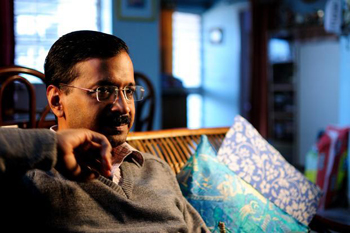 New Delhi, Feb 2: After careful scrutiny of papers submitted by the electricity distribution companies to the Delhi Electricity Regulatory Commission (DERC) in the past couple of years, the technical experts committee of the Aam Aadmi Party (AAP) has concluded that these companies were making huge profits while showing losses in their books to demand periodical rise in tariffs from the government.
New Delhi, Feb 2: After careful scrutiny of papers submitted by the electricity distribution companies to the Delhi Electricity Regulatory Commission (DERC) in the past couple of years, the technical experts committee of the Aam Aadmi Party (AAP) has concluded that these companies were making huge profits while showing losses in their books to demand periodical rise in tariffs from the government.
Alleging that Chief Minister Sheila Dikshit conspired with these companies owned by Reliance (Anil Dhirubhai Group) and Tata group, AAP convenor Arvind Kerjriwal said that Dikshit was instrumental in stopping the then DERC chairperson from reducing the power tariffs when he “saw through the games being played by these companies”.
“Every Delhiites is paying twice the electricity bill than he should be paying. As per the papers accessed by us through RTI, we have learned that, then (2010) DERC chairperson Brijender Singh had concluded that instead of Rs 630 crore losses that these companies were claiming, they had in fact made a profit of Rs 3,577 crores. When he decided to reduced the tariff by 23 per cent, the Delhi government advised him against doing so,” said Kejriwal flaunting a letter in this regard written by the then S M Ali, Joint Director (Power) on May 4, 2010.
He added that every time there is hike in power tariff, Dikshit passes on the responsibility to DERC saying that the government has nothing to do with it. But, when it decides to reduce the tariffs, she interferes and puts pressure on it from doing so.
Slamming Anil Ambani and his companies, BSES Yamuna Power Limited (BYPL) and BSES Rajdhani Power Limited (BRPL), Kejriwal said that the two companies bought required transformers and other equipment from one of its own sister company and then claimed to have bought them at double the price to inflate their expenses and thus losses.
“Between 2004 to 2006, Anil Ambani companies showed purchasing equipments worth Rs 1,428 crore from their sister company Reliance Energy Limited (REL). When Brijender Singh asked these Discoms to produce the records of REL to see the price they refused saying that is a different company and have no access to their records. When he checked the VAT (Value Added Tax) records of REL from the concerned department, he found that they had in fact purchased these equipment at just Rs 850 crore,” alleged Kejriwal.
He added that these companies were even showing zero bills for thousands of consumers and organisations like Delhi Jal Board (DJB) and Delhi airport, etc.
Meanwhile, the chief minister in a statement released by her office claimed that the “so-called tariff order (to reduce tariff by 23 per cent) was nothing but the personal opinion of the then chairman based on false assumptions”.





Comments
Add new comment